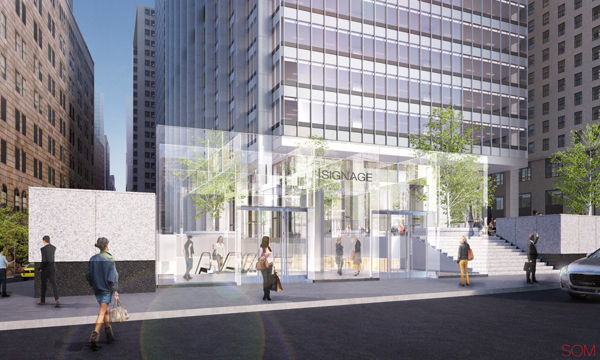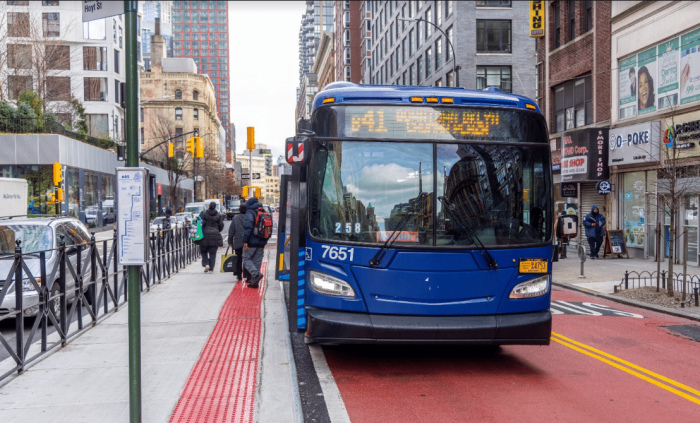
Fosun’s request to modify its deed restriction to allow for this glass pavilion over the entrance to its underground retail space at 28 Liberty Plaza caused chaos at Community Board 1’s July 26 meeting.
BY ALEX ELLEFSON
Call it a case of Rivington Contagion.
One of the first tests of the city’s new public review process for changing deed restrictions — enacted in response to the Rivington House property-flipping scandal — hit a snag Tuesday when Community Board 1’s monthly meeting devolved into a shouting match over a deed modification for a downtown plaza.
Developer Fosun Property Holdings had already gone through a review process to make changes to the landmarked 60-story tower and adjacent plaza at 28 Liberty Street, with both CB1 and the Landmarks Preservation Commission green-lighting Fosun’s request last year to renovate the site by adding glass pavilions at the entrances to a retail space below the plaza.
But to move forward with the project the developer needs to modify height limits imposed by a 1961 deed restriction in order to add the three pavilions.
Such a modification would have been a routine matter of paperwork before the Rivington House debacle led the city to require public review of all deed restriction changes. And earlier this month, CB1’s planning, landmarks and Financial District committees voted 15–0, with one recusal, in favor of a resolution allowing Fosun to build two of the three pavilions.
But when the resolution came up for a vote by the full board on July 26, the meeting plunged into chaos when Financial District Committee chairwoman Susan Cole asked for it to be tabled until the next meeting, which isn’t until September.
“The real issue here is the deed restriction. And that to me is a very big issue because it that has been in place for 60 years,” Cole said. “I think those of you who have not seen it or walked the site owe it to yourselves and the community, especially with all this brouhaha around deed restrictions, to understand what you are voting on.”
The majority of the board ultimately supported Cole’s request, but not before a 20-minute verbal brawl over whether deferring the decision was necessary.
“As a board member, I am really frustrated,” said Reggie Thomas, who noted that close to half the members present were represented in the committees that endorsed the resolution on July 6. “I did my homework, half the board was given an opportunity to do their homework, but now we have to penalize the applicant.”
CB1’s new chairman, Anthony Notaro, also wondered why the resolution with near-unanimous support from three committees suddenly had to be tabled.
“I don’t understand why 16 people looked at this and voted and now we have so much concern about it,” he said.
Fosun’s request has become a test case for the new review process required to modify deed restrictions. The city introduced the reforms this month in response to the controversy surrounding Rivington House — in which a developer paid the city $16.1 million to lift a deed restriction requiring the site to be used as a nursing home, and then sold the property for $116 million to become condos. The reforms provide additional layers of oversight to the process, starting with input from the community board.
Patrick Kennell, chairman of the Planning Committee, said he worried that tabling to resolution until September burdens the developer unnecessarily.
“I also don’t know exactly what members of the full community board are going to get out of an extra two months,” he said. “The modifications that are being requested aren’t going to change between now and then.”
But others felt it was important for members to have more time to review the changes and scope out the site for themselves — especially considering the weight of the new review process.
“I don’t see any suffering by asking the applicant to wait,” said said Roger Byrom, chairman of the Landmarks Committee. “I do think it would allow the community to better understand this and make an informed decision. The purpose of the deed restriction though, was to really keep this open.”


































